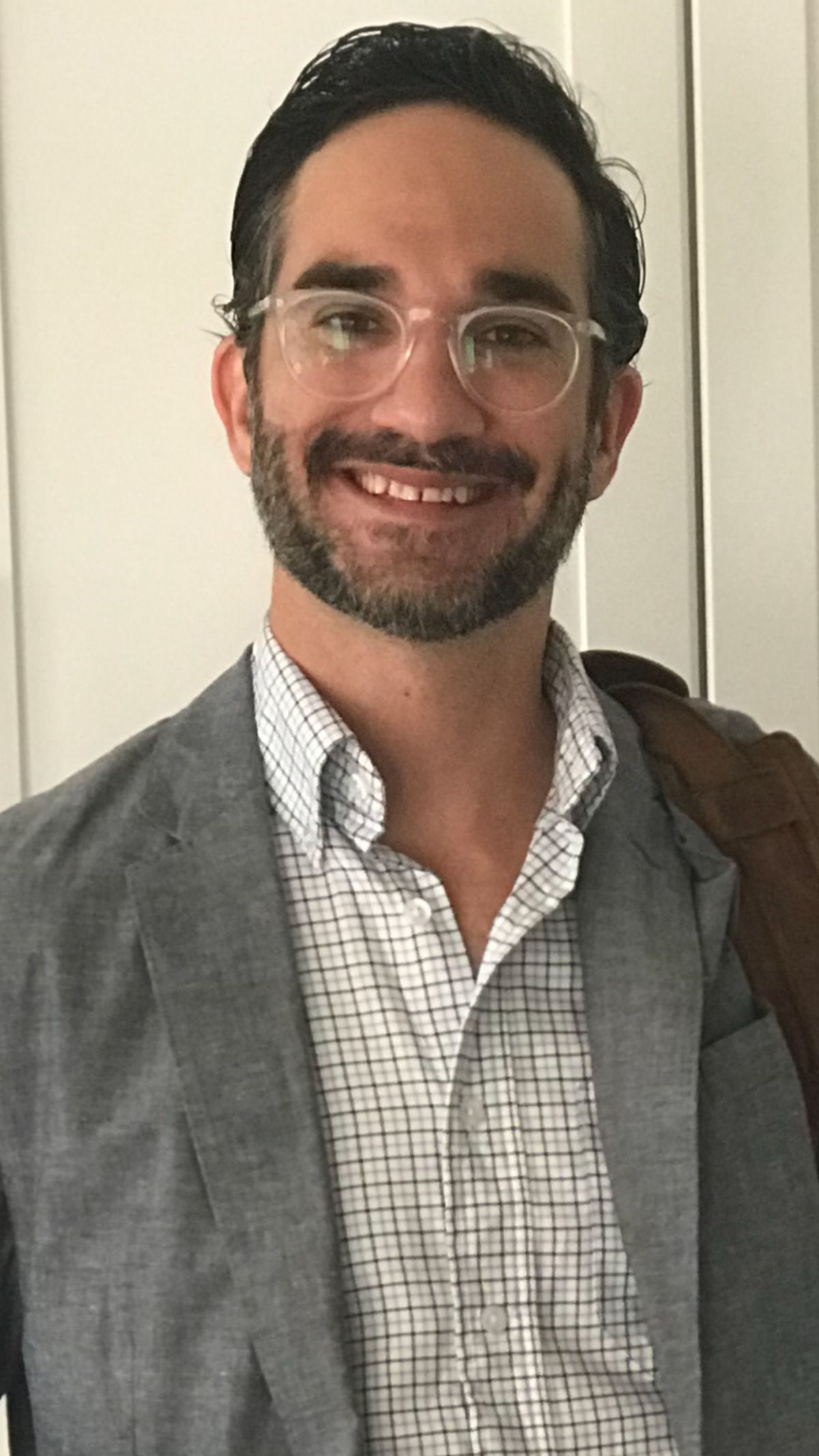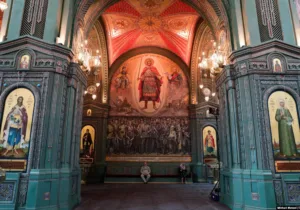Shadi Hamid’s recent essay in The Atlantic, “America without God,” has spurred much discussion about the nature of current public discourse and the state of ideological intensity exemplified on both sides of the political spectrum. Hamid has proven himself an important voice on such topics well before this publication, and this piece is quite worthy of our attention. He provides a great service to the American public by highlighting the interrelation between the decline of traditional religious adherence and the emergence of the phenomenon of making a religion out of politics. A spiritual vacuum has been created that has become increasingly filled with cult-like devotion to ideologies and theories—whether critical or conspiratorial. The woke left and the messianic Trumpism on the right are both expressions of this development. It is salutary that a broader set of Americans are furnished with the proper resources to recognize this fact.
While I am in large agreement with Hamid’s essay, I find myself a bit underwhelmed for a few reasons.
First, the basic argument, though persuasive, is somewhat unoriginal. At least since the time of Karl Marx, scholars have described certain modern ideologies as resembling traditional religions in structural ways. One could depict the period from the French Revolution to the end of the Cold War as an age of ideologies, and many scholars throughout that time have argued that politics has taken on a religious nature for many—meaning, it becomes the site of ultimate loyalties, calling for zealous devotion in pursuit of an earthly paradise or at least the rendering of a final judgment on one’s enemies. Arguments similar to those found in Hamid’s essay have been proffered by political theorists and sociologists such as Raymond Aron, Eric Voegelin, Emilio Gentile, Steven D. Smith, and Joshua Mitchell. Prominent Christian public commentators Richard Neuhaus, Joseph Bottum, and Tara Isabella Burton, as well as Christian theologians of the likes of Henri de Lubac, Hans Urs von Balthasar, Sergei Bulgakov, and William Cavanaugh, not to mention Abraham Kuyper, whom Hamid invoked in the essay, have all argued that modern politics can function as an ersatz religion in modern, post-Christian societies.
And, as Rusty Reno recently pointed out, much of the intellectual labor in the post-WWII era was devoted to addressing such problems by trying to dissolve thick loyalties (“strong gods”) to construct a public discourse on a “rational” basis that would promote a more “open” society that keeps all totalitarian impulses at bay. But the problem with such a solution is that it can also be understood as a part of the larger modern project of seeking to manufacture a sociopolitical order devoid of higher principles—i.e., without reference to God, metaphysics, nature, or ultimately any obligation other than those chosen by the self.
This brings me to my second cause for reservation: there is a certain ambiguity in Hamid’s proposed solutions. I am particularly perplexed by his comments about separating politics from metaphysics, and the need to reduce the political to the mundane realities of this world. First of all, this is impossible. Every political order reflects a tacit metaphysics—an interpretation of human nature and the nature of reality (including the existence and relevance of God). Thus, politics is inescapably metaphysical and theological.
While there are certainly wrong ways to tie politics to the metaphysical and/or theological, the solution is not to attempt to divorce those realities completely. As de Lubac argued so effectively in his early works, a theology that ignores temporal considerations becomes an unwitting ally to secularization. Ironically, a purportedly “secular” social order then ends up eliciting the emergence of secular religions—or “neopaganisms,” as de Lubac described them, a description echoed in the recent work by Steven D. Smith. These seek to fill the void left behind, but ultimately do not accord with our constitution as humans created for dependent communion with God and fallen due to the original sin of Adam.
I take Hamid’s point to be that politics should be put in its proper place; I just don’t think that viewing it in independence from the theological and metaphysical is the best way to accomplish that goal. The problem in our politics, as in so much of life according to Augustine, is that of disordered loves. The way to order our loves is not to denigrate the created realities that we are prone to idolize, but to love them properly—in, through, and unto God. Or, according to the theology of Thomas Aquinas, we can think of this in terms of primary and secondary means, or ultimate and proximate ends. Though we cannot ultimately hope in or rely on created realities, including politics, we can hope in and rely on them as secondary causes, permitted they are referred to our ultimate end in God. Thomas understands the political world as a cause of hope and an object of hope in a secondary sense. The earthly city cannot be hope’s primary interest, but earthly projects, if referred to hope’s ultimate end, may become part of the overall project of the beatific vision.
This is all relevant for attempting to understand Hamid’s point in the extremely ambiguous final comments. He promotes the “American creed” as worth believing in, but leaves the link between that “faith” and traditional religious belief underdetermined. It is not clear if he thinks that a proper orientation to the American creed is largely independent in regards to traditional religious faith (and thus the two “beliefs” are unrelated or mutually exclusive), or if he thinks faith in this civic creed is nurtured by religious devotion, or if belief in the American creed must be subordinated to the dictates of traditional religion. I am not entirely sure what his argument is on this point, but my best guess is that Hamid’s view is something analogous to the thought of Jacques Maritain, the great philosopher of Christian democracy in the mid-twentieth century. Maritain made the case that modern liberal societies should be structured around a secular civic creed that people from different faiths can adhere to; at the same time, he argued that deeper Christian belief leads one to greater endorsement of this common secular faith. Maritain went so far as to argue that Christians and Christian institutions have a role in fostering this common secular faith. The danger here is that it can instrumentalize Christianity for political purposes—subordinating it to the interests of the nation. This form of linking puts matters out of order.
Christian theology and a proper metaphysic enable us to rightly order our politics. All of our political loyalties, identities, activities, and programs are to be approached sub specie aeternitatis. Politics must be de-absolutized, but not rendered autonomous in regard to the theological. We need more religion, not less.
Thus, Hamid’s assertion that religion is (in part) about distancing from the temporal world seems inadequate. A charitable interpretation would, again, involve the de-absolutizing of politics mentioned above, but this language lends itself too easily to pietistic spiritualizing and political quietism. This is far from the approach of Kuyper, who was adamant about Christian engagement in every sector of society, proclaiming the reign of Christ over all things—including the political. We have, beyond worldly politics, an eternal hope, a heavenly home, and our ultimate citizenship is in the Kingdom of God. We will remain ultimately restless in this world, and thus can make no permanent home in any earthly inns during our pilgrimage. To do so would be to commit idolatry, as mentioned above. But Christian scripture also describes us as resident aliens who are to seek the welfare of the polities in which we reside during our earthly exile.
Our posture should be one of critical ambivalence regarding the political happenings around us. We know that this age and this world matter, and thus we must do what we can to love and bless our neighbors. But our expectations are limited, and we remain agnostic about the outcomes of any particular political developments. This means that our politics must be desacralized. But Christians should engage the world of politics, seeking to influence our societies that we can and should criticize according to how such societies recognize the spiritual, supra-political nature of the person and permit the mission of the church.
This leads to my final reason for reservation: there is a certain individualism in Hamid’s piece. What I mean by this is that he largely limits his analysis to the role of religion in the psychology of persons, but says little about how our society and political order should relate to the religious. Therefore, it fails to account for how the religious dimension of the human person is denigrated and pushed to the “private” sphere in modern liberal societies. For example, to understand the relation between the religious and political, we need to reject the vision of John Rawls and move beyond the proposal of Jürgen Habermas; religious reasoning should not be precluded from public discourse, and the mere idea of a pluralistic public discourse that permits religious language is not enough. We have to also account for the Böckenförde Paradox: the idea that liberal societies depend on non-liberal realities that liberal structures can neither produce nor sustain. Liberal societies require a virtuous, and thus religious, citizenry, as many of the Founding Fathers recognized. But, as the Tocquevillians have long argued, liberal societies seem to undermine the very institutions that inculcate such virtue.
Such societies do this not only through the general disdain expressed toward religion by individuals, academia, the entertainment industry, the media, etc., but even more fundamentally by the structural division between the “spheres” of religion and politics. The eminent French political philosopher Pierre Manent discusses the idea of the “theological-political problem” inherent in post-Christian, liberal societies—i.e., that Christianity contributed to the liberation of the secular while, at the same time, devaluing political societies. Christianity helped facilitate the desacralization of politics—which Hamid admits is necessary, in his own words—while also upholding the church as the only truly universal community. According to Manent’s analysis, this has often been perceived as a threat to the state, and thus modern political societies have sought to completely disestablish and increasingly domesticate the church. Manent explains that the “regime of separations” that results ultimately splits man in two, and eventually totalitarian forces emerge that attempt to achieve reintegration. This helps explain the religionizing of politics that continues to pop up in purportedly secular societies, to which Hamid helpfully draws attention.
To protect politics from taking on religious significance, our polities need to recognize the ineluctably religious nature of the human person—what Maritain referred to as the “primacy of the spiritual”—and, therefore, promote religious institutions and ecclesial bodies. Otherwise, members of American society will continue to be tempted with investing religious energy into temporal politics. And religion and politics will both suffer.







 Live in the DC area? Sign-up for Providence's in-person events list!
Live in the DC area? Sign-up for Providence's in-person events list!